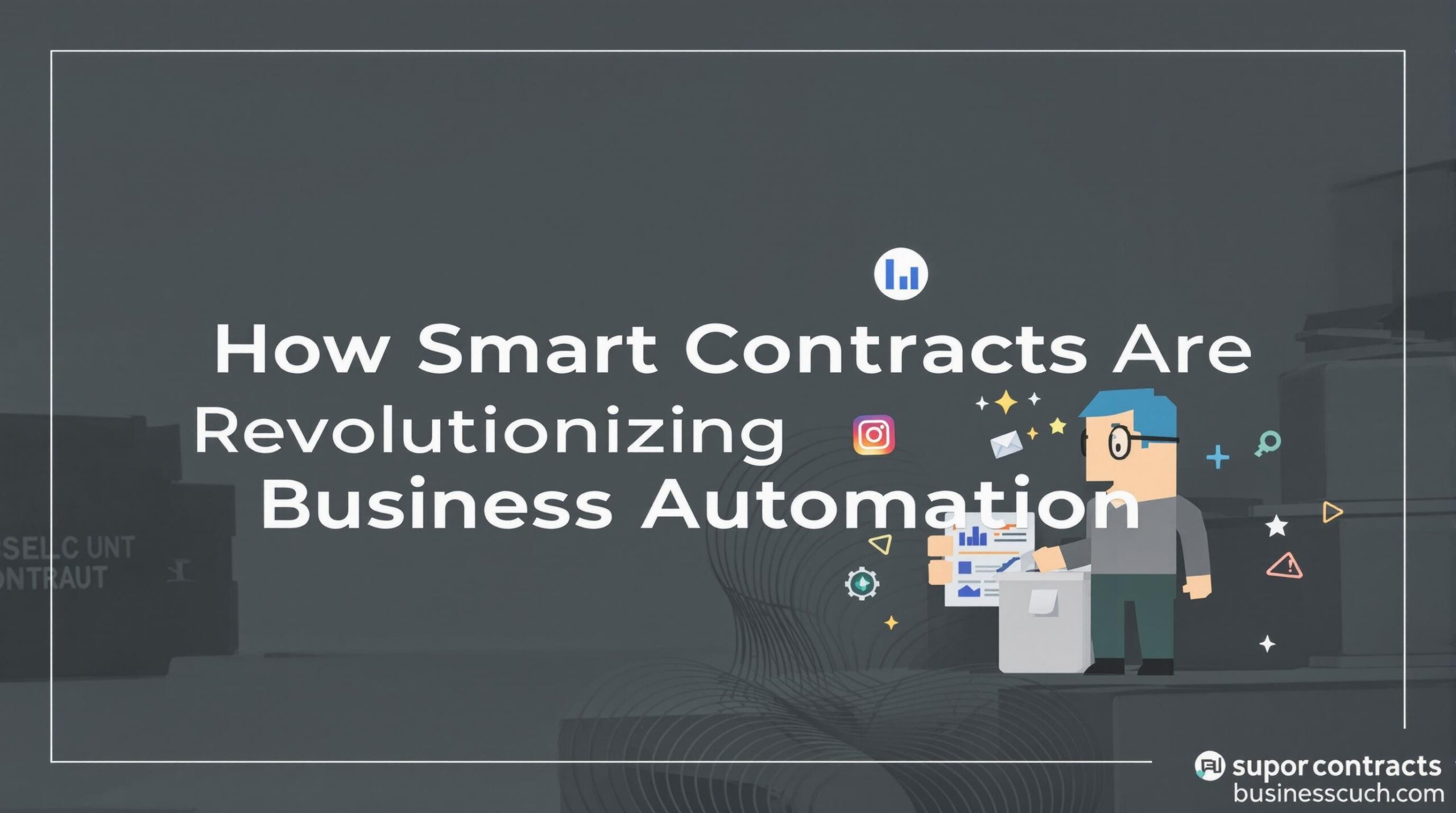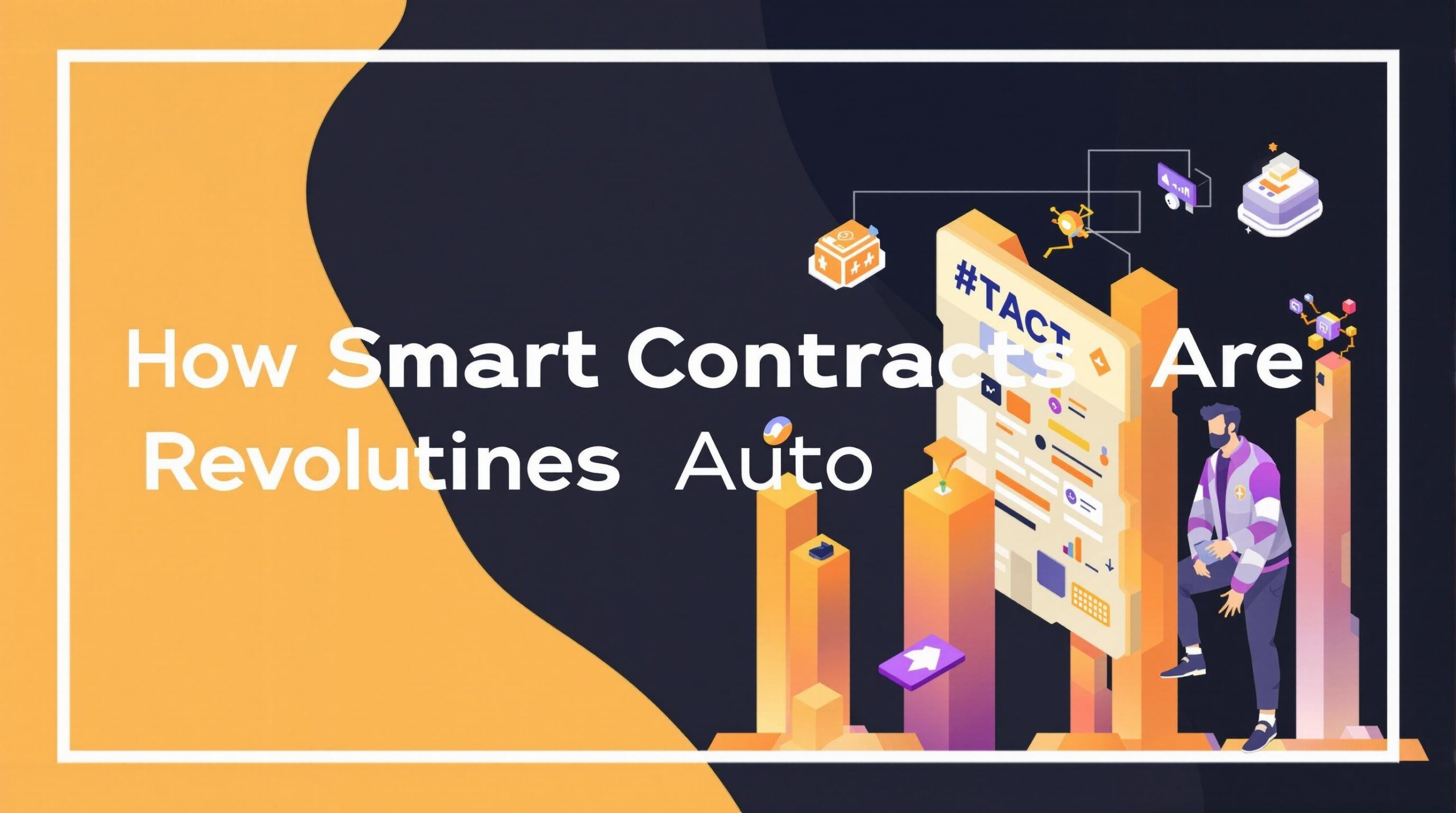Introduction to Smart Contracts
Smart contracts are changing the landscape of business automation by providing a secure, efficient, and decentralized way to execute agreements. But what exactly are smart contracts, and how do they fit into the realm of business automation?
What are smart contracts? Smart contracts are self-executing contracts with the terms of the agreement directly written into lines of code. They allow for automated, reliable transactions without the need for intermediaries.
Imagine a vending machine as the simplest analogy for understanding how smart contracts function. You insert money or cryptocurrency, press a button, and automatically receive your selected product. There’s no need for a cashier. This is how smart contracts aim to streamline processes across various industries by removing the middleman, ensuring transparency and reducing costs.
Characteristics of Smart Contracts
Why are smart contracts considered revolutionary in modern business practices? Let’s explore some of their core characteristics:
- Automated Execution: Once the predetermined conditions are met, the contract executes actions automatically.
- Immutability: After being deployed on the blockchain, smart contracts cannot be altered, which ensures integrity and trust.
- Transparency: Transactions are visible and verifiable by all parties involved, preventing manipulations and disputes.
- Cost Efficiency: Reduces the need for intermediaries and associated fees, making processes more economical.
- Security: Utilizing blockchain technology, these contracts are protected by cryptographic security, minimizing risks of fraud.
The application of smart contracts extends beyond simple exchanges. For instance, the world of cryptocurrency heavily relies on smart contracts to enable decentralized finance (DeFi) operations. In Africa, these contracts are being used to improve financial inclusion by making essential services more accessible to a wider audience.
Jara and the Business Automation Revolution
Jara is at the forefront of utilizing smart contracts to facilitate Africa’s digital asset economy. With its comprehensive platform, Jara empowers investors through tokenization and a proprietary Layer 2 blockchain. This infrastructure bridges the gap between global capital and African assets, presenting new opportunities and advancing economic empowerment.
“Invest in $JARA and be part of Africa’s digital future. Our platform is designed for seamless integration with the real-world asset tokenization, offering unmatched benefits to stakeholders.”
By holding and utilizing $JARA, participants gain access to a vibrant ecosystem that not only supports efficient asset management but also enhances community engagement through socially integrated features. Additionally, smart contracts facilitate various processes within the Jara ecosystem, ensuring everything from asset transfers to stakeholder rewards are executed with precision and reliability.
The Role of Smart Contracts in Transforming Industries
As industries continue to embrace digital transformation, smart contracts are playing a pivotal role in redefining how businesses operate. Their utility spans across numerous sectors, including finance, supply chain management, and even legal services. By creating trustworthy and automated environments, these contracts remove the barriers traditionally imposed by complex, manual processes.
- Finance: Facilitates seamless transactions, reduces settlement times, and introduces innovative financial products.
- Supply Chain: Ensures transparency in tracking goods, contracts, and payments, minimizing errors and delays.
- Legal Services: Automates document execution and validation, thereby enhancing efficiency.
Such capabilities highlight why smart contracts are considered a game-changer in business automation. By paving the way for more transparent and efficient processes, they are not merely a technological trend but a fundamental shift in how businesses will operate in the new digital economy.
Embracing the power of smart contracts and blockchain technology opens up unprecedented opportunities for growth and innovation. With platforms like Jara leading this transformation, businesses in Africa and beyond are set to embark on a journey toward a more inclusive, efficient, and secure future.
Advantages of Smart Contracts in Business Processes
Enhanced Efficiency and Accuracy
In today’s fast-paced business world, efficiency and accuracy are critical. Businesses are constantly seeking ways to eliminate bottlenecks and reduce errors in their processes, and smart contracts are proving to be a game-changer. But what exactly makes them so effective?
How do smart contracts improve business efficiency? Smart contracts streamline operations by automating tasks, reducing the need for manual intervention, and minimizing the human errors that often slow down business processes.
Firstly, smart contracts are self-executing contracts with the terms written directly into code. This automation ensures that the contract’s stipulations are executed by the network without any delays or the need for human oversight, which enhances efficiency. Imagine a vending machine; once the correct amount is inserted, the mechanism automatically delivers the product. Similarly, a smart contract executes a sale or transfer as soon as the predefined conditions are met.
- Seamless Transactions: With smart contracts, transactions become a breeze, eliminating the middleman and allowing for direct interaction between parties.
- Reduction in Errors: Since these contracts handle details autonomously, there is significantly less room for human error, ensuring more accurate and reliable operations.
- Cost Efficiency: By cutting out intermediaries, businesses can significantly reduce transaction costs, making smart contracts an attractive option for cost-conscious businesses.
An excellent illustration of this revolutionary technology is seen in Africa, where Jara is leveraging its potential to bridge global capital to African assets. By utilizing smart contracts, Jara enhances transaction speed and reliability, serving as a crucial component in Africa’s digital transformation.
“Invest in $JARA: Fuel Africa’s $200B+ Digital Asset Economy and Participate in a Revolutionary Ecosystem.” With $JARA, smart contracts are not just about cutting costs—they offer a pathway to innovation and financial inclusion.
Moreover, the use of blockchain technology, which underpins smart contracts, ensures transparency and security, adding an extra layer of trust that traditional contracts often lack. This visibility and security are particularly attractive in contexts where trust is paramount.
In conclusion, the integration of smart contracts into business processes is akin to fitting a business with a robust engine—it optimizes performance, ensuring that everything runs smoothly at full capacity. As the adoption of smart contracts continues to rise, businesses that embrace this technology, like Jara in Africa, will lead the pack in terms of efficiency and accuracy.

Implementation Challenges and Solutions
Implementing smart contracts into business operations can seem like a daunting task, yet it holds the potential to revolutionize how businesses automate processes. In the quest for streamlined operations, companies face a myriad of challenges when integrating smart contracts. So, what are the most common hurdles businesses encounter with smart contract integration, and how can they overcome them?
What is a smart contract? A smart contract is a self-executing contract with the terms of the agreement written directly into lines of code.
Security Concerns
One of the primary concerns when implementing smart contracts is the potential for security vulnerabilities. These contracts are immutable, meaning once they are deployed, they cannot be altered. This can pose a significant risk if there are bugs or unforeseen loopholes within the code. Interestingly, businesses must ensure robust auditing and testing of smart contracts before deployment to mitigate these risks.
- Importance of Thorough Code Audits: Regularly conduct comprehensive audits by third-party security experts to detect and rectify vulnerabilities.
- Utilizing Reliable Platforms: Choose platforms and tools that provide security certifications and have a good track record of security measures.
- Implementing Best Practices: Follow industry-standard coding practices to ensure smart contract integrity.
For instance, projects on the blockchain require diligence to prevent potential fraud and cyber threats, which underscores the importance of security in digital finance.
Legal and Regulatory Compliance
Another significant challenge arises from navigating the complex legal and regulatory landscape associated with smart contracts. Regulatory frameworks in different jurisdictions can be vastly different, and businesses must comply with all relevant laws. Do you wonder how businesses can stay compliant while utilizing smart contracts?
How can businesses ensure compliance? Companies should engage legal experts familiar with blockchain technology and actively monitor evolving regulations to stay compliant.
- Adapting to Local Laws: Businesses should tailor smart contracts to align with local laws and industry regulations, ensuring adherence.
- Regular Legal Consultations: Regular consultations with legal professionals can help in navigating and adjusting to new regulations.
Organizations like Jara are setting examples by integrating smart contracts into business operations securely and legally, ensuring a compliant yet innovative approach.
Integration with Legacy Systems
Many businesses operate with complex, outdated systems that are not natively compatible with blockchain technology. Integrating smart contracts with these legacy systems can pose significant technical challenges. What strategies can companies adopt to overcome this hurdle?
- Implementing Middleware Solutions: Middleware solutions can facilitate communication between blockchain networks and existing systems.
- Gradual Migration Strategy: A phased integration approach allows businesses to gradually shift processes to smart contracts without disrupting existing operations.
- Training and Adaptation: Invest in training employees to manage and work effectively with new blockchain integrations.
Moreover, partnerships with tech-savvy organizations such as Jara can facilitate a smoother transition by leveraging their expertise in blockchain technology.
Cost Implications
The cost associated with implementing and maintaining smart contract systems can seem prohibitive to some businesses, especially small and medium-sized enterprises (SMEs). However, the long-term benefits often outweigh the initial investment. So, how can businesses manage these costs effectively?
Is smart contract integration costly? While initial costs can be high, smart contracts reduce operational expenses by automating repetitive tasks, which leads to long-term savings.
- Cost-Benefit Analysis: Conduct a thorough analysis to determine the potential savings and efficiency gains from smart contract integration.
- Leveraging Economies of Scale: Larger projects can distribute the cost of integration across more transactions, making it more economical.
- Utilizing Grants and Funding: Explore potential grants and funding opportunities to ease the financial burden of technological transitions.
Businesses are learning from innovative ventures like Jara, which illustrates how the smart use of emerging technologies can mitigate financial impacts in the long run by incorporating cost-saving strategies.
Future of Business Automation with Smart Contracts
As we look towards the future, smart contracts are set to become a game-changer in business automation. With rapid advancements in blockchain technology, the potential for smart contracts to streamline processes is immense. But what exactly makes these digital agreements so promising?
What are smart contracts? Smart contracts are self-executing contracts with the terms of the agreement directly written into code. They automatically enforce and validate a contract without the need for intermediaries.
These digital contracts offer several benefits, including increased efficiency, reduced costs, and enhanced security. Imagine a world where businesses no longer rely on third parties to manage transactions or validate agreements. Instead, the code ensures all stipulations are met before executing any operations, a concept that is set to drastically reduce delays and errors.
Enhancing Security with Automation
One of the most significant advantages of smart contracts is their ability to increase security. By using blockchain technology, these contracts offer an immutable record of transactions. This means that once a contract condition is met and encoded into the blockchain, it cannot be altered or reversed. Such a feature is incredibly valuable in preventing fraud and ensuring trust within digital ecosystems.
With security being a paramount concern for businesses, especially in financial dealings, smart contracts provide peace of mind. They can automatically detect and prevent unauthorized changes, thus safeguarding sensitive information. This shift towards a more secure automative approach helps protect against potential cyber threats and offers a new level of confidence in digital transactions.
Streamlined Processes for Better Efficiency
The automation of processes through smart contracts is not just about security; it’s about efficiency too. Companies spend a significant amount of time and resources on administrative tasks like verification and enforcement of agreements. By removing the need for manual intervention, smart contracts can greatly reduce overhead costs.
For instance, in sectors like supply chain management, smart contracts automate every stage of the process—from production to delivery. As every step is pre-programmed into the contract, automated checks ensure that each task is completed before moving onto the next, significantly speeding up operations and reducing costs.
Integration with AI and IoT
The potential of smart contracts is further amplified when integrated with Artificial Intelligence (AI) and the Internet of Things (IoT). By syncing real-world data with contract terms, businesses can create systems that automatically respond to certain triggers.
Consider a scenario where sensors detect that inventory levels are low. The system could autonomously initiate a reorder through a smart contract, adjusting orders based on predictive AI models. This level of automation not only optimizes inventory management but also ensures real-time data-driven decision-making.
Impact on Africa’s Digital Asset Economy
For Africa, the role of smart contracts in business automation presents a unique opportunity. Africa is experiencing rapid digital transformation, and the application of smart contracts could become a cornerstone for this wave. The decentralized and automated nature of smart contracts can help bridge the infrastructure gap while bringing transparency and efficiency to markets traditionally plagued by inefficiencies.
“By investing in $JARA, we’re fueling this revolution, unlocking $200B+ worth of digital assets, and empowering Africa’s financial future.”
The Jara platform, with its socially integrated wallet and AI-powered influencers, stands at the forefront of utilizing smart contracts to transform how digital assets are managed across the continent. Through these smart contracts, Jara not only accelerates asset digitization but also ensures that investors and businesses can operate with enhanced trust and security.

Smart contracts are transforming business automation by increasing efficiency, reducing costs, and eliminating errors through their autonomous and decentralized execution of agreements.

Related Practice Areas
Explore other practice areas we serve that are related to the integration and impact of smart contracts in business automation.
Discover What Our Clients Are Saying
At the forefront of our Smart Contracts & Automation practice is a deep-seated commitment to client satisfaction. Each case is handled with utmost care, as echoed in the appreciative feedback from those we represent.

Partner with Us for Unmatched Expertise in Smart Contracts
At Jara, we are at the forefront of merging legal precision with cutting-edge technology. Our team has a proven track record in leveraging smart contracts to supercharge business automation.
We’re committed to providing unparalleled service, backed by accolades that highlight our expertise and commitment to excellence.
- Listed among the “Top Tech-Savvy Law Firms in Silicon Valley” 2023 by TechLaw Magazine – Honoring firms that excel in integrating technology within their legal services. Learn More
- Highlighted in the “Leading Blockchain Legal Innovators” 2023 by Blockchain World – Recognizing firms that are pioneering the blockchain and smart contract revolution. View Award
- Named as one of the “Best Legal Automation Experts” 2023 by Automation Today – Celebrating firms that effectively streamline legal processes through innovative solutions. See Details
- Featured in “Top 10 Future-Ready Law Firms” 2023 by Legal Innovators – Showcasing firms prepared to lead in the evolving landscape of legal technology. Explore Here
- Recognized among the “Top Smart Contract Specialists” 2023 by Tech Law Insights – Acknowledging firms setting benchmarks in smart contract implementation. Read More
Ready to transform your business operations? Contact us via email, or download our app on Android and iPhone to discover how Jara can revolutionize your approach to business automation with smart contracts.
Chinyere “Chi” Nnadi Bio
Founder and CEO, Jara | Business Automation Specialist
Content Reviewed by Chi Nnadi and his Content Team. Chi is an experienced entrepreneur dedicated to transforming Africa’s financial ecosystem through blockchain technology. As Founder and CEO of Jara, he builds enterprise-grade infrastructure converting illiquid African assets into globally accessible digital tokens. With his proprietary Layer-2 blockchain technology and expertise in business automation, Chi bridges the gap between global investors and Africa’s growing digital asset market.

















